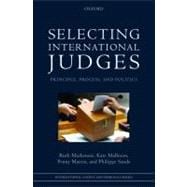
Note: Supplemental materials are not guaranteed with Rental or Used book purchases.
Purchase Benefits
What is included with this book?
| Foreword | p. vii |
| Series Editor's Preface | p. ix |
| Preface and Acknowledgements | p. xi |
| List of Abbreviations | p. xiii |
| Introduction | p. 1 |
| The International Court of Justice and the International Criminal Court in Historical Context | p. 7 |
| Introduction | p. 7 |
| From ad hoc arbitration to permanent courts of justice | p. 10 |
| The International Court of Justice | p. 17 |
| The International Criminal Court | p. 19 |
| Conclusion | p. 22 |
| The Composition of the International Courts | p. 24 |
| Introduction | p. 24 |
| General selection criteria for the bench | p. 26 |
| Individual selection criteria for the ICJ and ICC | p. 49 |
| Conclusion | p. 60 |
| The Nomination Process | p. 63 |
| Introduction | p. 63 |
| ICJ and ICC nomination rules | p. 66 |
| Nomination bodies | p. 69 |
| ICJ and ICC nominations in action | p. 73 |
| Conclusion | p. 98 |
| The Election Process | p. 100 |
| Introduction | p. 100 |
| ICJ and ICC election rules | p. 102 |
| The role of the UN regional groups | p. 105 |
| Campaigning | p. 110 |
| Vote-trading | p. 122 |
| The voting process | p. 128 |
| Trends and Reforms | p. 137 |
| Introduction | p. 137 |
| Transparency | p. 137 |
| Independence and non-politicization | p. 144 |
| Competence and merit | p. 152 |
| Diversity and representation | p. 161 |
| Conclusion | p. 171 |
| Conclusions | p. 173 |
| Summary of findings on the ICC and ICJ | p. 173 |
| The broader relevance of the findings-trends and reforms | p. 175 |
| Research Methodology | p. 180 |
| Background | p. 180 |
| Questionnaires | p. 181 |
| Interviews in New York | p. 181 |
| Case studies | p. 182 |
| The Jurisdiction and the Judicial Selection Procedures of the ICJ and ICC | p. 186 |
| The jurisdiction of the International Court of Justice | p. 186 |
| The nomination and election of ICJ judges | p. 187 |
| The jurisdiction of the International Criminal Court | p. 191 |
| The nomination and election of ICC judges | p. 192 |
| International Criminal Court Assembly of States Parties: Resolution ICC-ASP/3/Res. 6 | p. 197 |
| Nomination of candidates for judges | p. 197 |
| Election of judges | p. 199 |
| Judicial vacancies | p. 201 |
| Illustrative tables of minimum voting requirements | p. 202 |
| Sample ballot paper: election of 6 judges of the ICC | p. 204 |
| Bibliography | p. 205 |
| Index | p. 219 |
| Table of Contents provided by Ingram. All Rights Reserved. |
The New copy of this book will include any supplemental materials advertised. Please check the title of the book to determine if it should include any access cards, study guides, lab manuals, CDs, etc.
The Used, Rental and eBook copies of this book are not guaranteed to include any supplemental materials. Typically, only the book itself is included. This is true even if the title states it includes any access cards, study guides, lab manuals, CDs, etc.